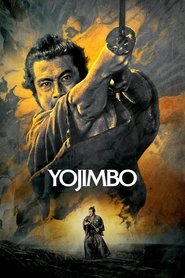In Roger Ebert's entry in Great Movies III, he rightly observes that Kurosawa:
… was deliberately combining the samurai story with the Western, so that the wind-swept main street could be in any frontier town, the samurai (Toshiro Mifune) could be a gunslinger, and the local characters could have been lifted from John Ford's gallery of supporting actors.
But Ebert immediately goes on to say that:
Ironic, that having borrowed from the Western, Kurosawa inspired one: Sergio Leone's A Fistful of Dollars (1964), with Clint Eastwood, is so similar to Yojimbo that homage shades into plagiarism.
Shades into plagiarism, you say? Interesting choice of words. Let's turn to Brian Eggert's essay in his Definitives collection, which corrects the 'film reviewer of record' with a few facts that would have been well-known to Ebert:
Leone’s producers attempted to secure permission to adapt Kurosawa’s film but never followed through, apparently hoping no one would notice that the film was merely a light resurfacing of Yojimbo’s template. Shamelessly, Leone would later claim ignorance when no screen credit was given to Kurosawa, while his producers attempted to cover up their blunder with ridiculous legal jargon. But the lawsuit eventually filed by Toho and Kurosawa Production Co. would prove victorious. In an out-of-court settlement, Kurosawa received 15 percent of the worldwide receipts for Leone’s film, whose release was delayed until 1967 in the U.S. because of the legal troubles. When it finally premiered, Kurosawa was still not given credit. In 1992, New Line Cinema purchased the rights to remake Yojimbo as a [weak] 1930s-style shoot-em-up gangster picture, called Last Man Standing.
Ebert-bashing aside, though, this does demonstrate something somewhat universal about cinema made outside of the imperial metropole. Or as Brian puts it:
Kurosawa’s Yojimbo testifies to the cyclical, international pathways of inspiration driving cinematic art.
Synopsis: A nameless ronin, or samurai with no master, enters a small village in feudal Japan where two rival businessmen are struggling for control of the local gambling trade. Taking the name Sanjuro Kuwabatake, the ronin convinces both silk merchant Tazaemon and sake merchant Tokuemon to hire him as a personal bodyguard, then artfully sets in motion a full-scale gang war between the two ambitious and unscrupulous men.

